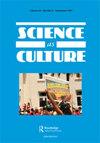Toxic Ignorance. How Regulatory Procedures and Industrial Knowledge Jeopardise the Risk Assessment of Chemicals
IF 2.4
3区 哲学
Q1 CULTURAL STUDIES
引用次数: 2
Abstract
ABSTRACT Science and Technology Studies research has shown that processes of producing ignorance have been structurally embedded in the evaluation and regulation procedures of the tens of thousands of hazardous chemicals present on the market. What is the role of industrial actors, regulatory experts and scientific data in the institutionalisation of ignorance? Analysing two European expert panels demonstrates that institutionalised ignorance makes it difficult to justify and implement stringent regulations covering all types of population exposure. First, experts get caught up in ways of using scientific data that tend to reinforce industry’s influence on the production of regulatory knowledge (and ignorance). Second, several constraints press experts to play by the rules of the ‘regulatory science’ game, even if this undermines their capacity to challenge the dominant rules of expertise and the relevance of data. Third, the routine functioning of regulatory science tends to favour industry-sponsored studies, while obscuring other knowledge that could have been useful for regulation. Together, these pressures illustrate the concept of toxic ignorance, which weaves together research on institutionalised ignorance, the political economy of science and the social study of toxics. This concept provides a fruitful way of exploring how ignorance is enacted in the public assessment of chemicals, as well as in other instances where the toxic consequences are indirect.有毒的无知。监管程序和工业知识如何危及化学品的风险评估
科技研究表明,在市场上成千上万种危险化学品的评估和监管程序中,产生无知的过程在结构上是根深蒂固的。在将无知制度化的过程中,行业参与者、监管专家和科学数据扮演了什么角色?对两个欧洲专家小组的分析表明,制度化的无知使得很难证明和实施涵盖所有类型人口暴露的严格法规是合理的。首先,专家们陷入了使用科学数据的方式,这些方式往往会加强行业对监管知识(和无知)产生的影响。其次,一些制约因素迫使专家遵守“监管科学”游戏的规则,即使这削弱了他们挑战专业知识和数据相关性主导规则的能力。第三,监管科学的常规功能倾向于支持行业赞助的研究,同时掩盖了可能对监管有用的其他知识。总之,这些压力说明了有毒无知的概念,它将制度化无知的研究、科学的政治经济学和有毒物质的社会研究交织在一起。这个概念提供了一种富有成效的方式,可以探索在化学品的公共评估中,以及在其他毒性后果是间接的情况下,无知是如何产生的。
本文章由计算机程序翻译,如有差异,请以英文原文为准。
求助全文
约1分钟内获得全文
求助全文
来源期刊

Science As Culture
Multiple-
CiteScore
5.20
自引率
3.80%
发文量
28
期刊介绍:
Our culture is a scientific one, defining what is natural and what is rational. Its values can be seen in what are sought out as facts and made as artefacts, what are designed as processes and products, and what are forged as weapons and filmed as wonders. In our daily experience, power is exercised through expertise, e.g. in science, technology and medicine. Science as Culture explores how all these shape the values which contend for influence over the wider society. Science mediates our cultural experience. It increasingly defines what it is to be a person, through genetics, medicine and information technology. Its values get embodied and naturalized in concepts, techniques, research priorities, gadgets and advertising. Many films, artworks and novels express popular concerns about these developments. In a society where icons of progress are drawn from science, technology and medicine, they are either celebrated or demonised. Often their progress is feared as ’unnatural’, while their critics are labelled ’irrational’. Public concerns are rebuffed by ostensibly value-neutral experts and positivist polemics. Yet the culture of science is open to study like any other culture. Cultural studies analyses the role of expertise throughout society. Many journals address the history, philosophy and social studies of science, its popularisation, and the public understanding of society.
 求助内容:
求助内容: 应助结果提醒方式:
应助结果提醒方式:


